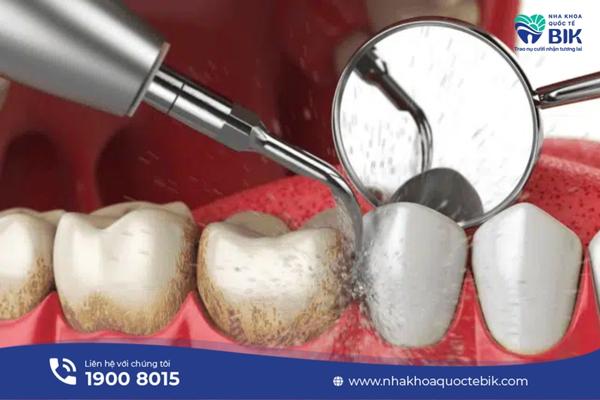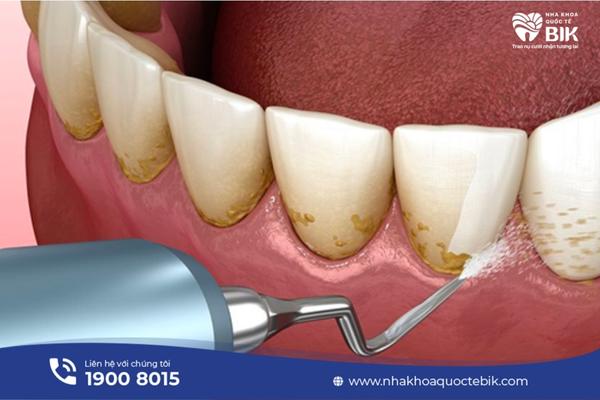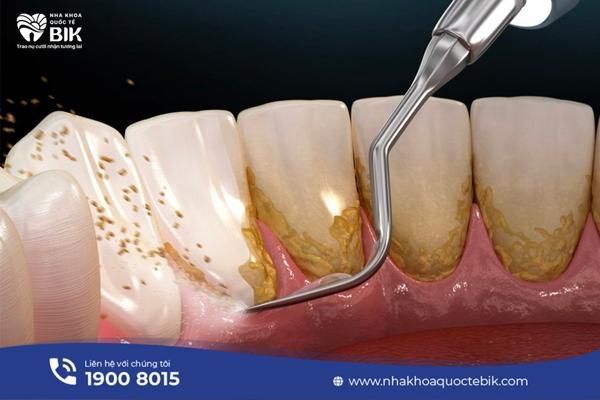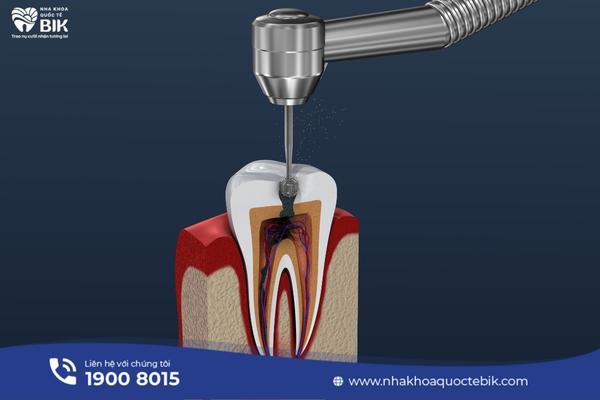The formation and adhesion of tartar between the gums and the tooth root is a fairly common condition for many people and causes many serious oral problems. Currently, the only solution to eliminate this condition is to have tartar removed at dental facilities. Although tartar removal is a simple and common technique, it has many effects in preventing oral diseases.
1. What is scaling?
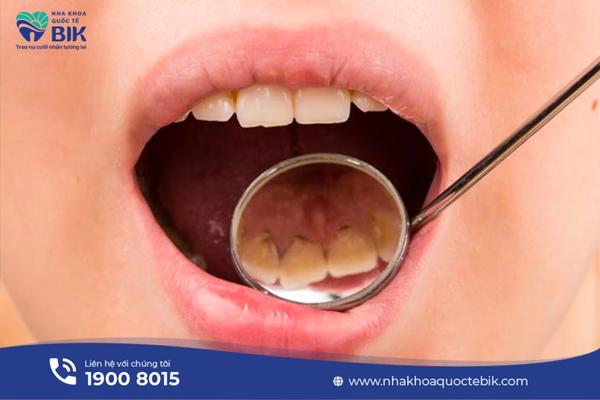
In fact, after eating for about 15 minutes, if the teeth are not cleaned, a thin layer of film will be left on the tooth surface. Over time, this layer will accumulate and form tartar that adheres firmly to the tooth surface or under the gum line.
So tartar is essentially plaque or food debris left in the oral cavity. Under the influence of bacteria, this plaque will calcify and is often opaque white or light yellow. The longer tartar accumulates, the thicker it will be and the darker the color will be. At the same time, this is the environment for bacteria to grow, causing many oral problems such as: periodontitis, pulpitis, bad breath, bleeding gums, etc.
Because tartar adheres very firmly to the tooth surface, professional scaling at the dentist is the only way to clean it. Scaling is the process in which the doctor uses a specialized tool to create vibrations to make the plaque fall off the gums and tooth body. This is a relatively basic and simple technique in dentistry but still requires precision and meticulousness from the doctor.
2. What are the effects of tartar?
If tartar is not removed for a long time, it can cause some effects such as:
2.1. Causes bad breath

Because bacteria hide under tartar to develop and wait for the opportunity to attack the gums and teeth, bad breath caused by one of these bacteria is inevitable. This unpleasant odor often cannot be eliminated with just basic daily oral hygiene steps.
2.2. Causes oral diseases
Bacteria in tartar can easily damage the patient’s teeth and gums. The mildest condition that these bacteria can cause is gingivitis and tooth decay. If gingivitis is not treated promptly, it will lead to periodontitis with symptoms such as: bleeding gums, toothache when eating and drinking…
2.3. Causing loss of aesthetics

Tartar is often light yellow in color, so it will lose the natural color of the teeth, making the patient lose confidence when smiling or communicating.
2.4. Loose teeth
In cases where the gums are strongly attacked by bacteria and are damaged to a certain extent, they will no longer be able to hold the teeth, causing the teeth to become loose and even fall out.
3. Effects of regular scaling
3.1. Improve aesthetics

Removing tartar means that the plaque on the tooth surface is uneven, which helps the teeth become whiter, bringing a confident smile when communicating.
3.2. Reduce the risk of oral diseases
During the process of cleaning tartar, bacteria in tartar will also be removed, helping to prevent their attacks that cause oral diseases such as tooth decay, gingivitis, pulpitis, etc.
3.3. Eliminate bad breath

Regular scaling helps eliminate bad breath effectively because the bacteria that cause unpleasant odors will be completely eliminated regularly. Therefore, just brushing your teeth properly every day will bring fresh breath all day long.
3.4. Protect teeth and jawbones
Because tartar is located between the gums and the tooth root, bacteria can easily attack and destroy the structure of teeth and gums. More serious consequences can be gingivitis, receding gums, jawbone loss, loose teeth or mass tooth loss.
4. Does scaling hurt?
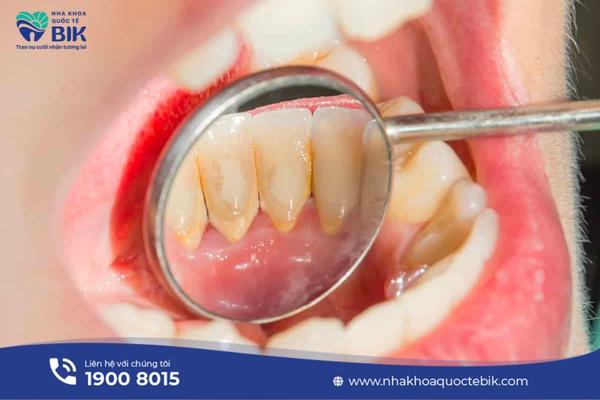
With the development of modern technology, dental facilities today are equipped with ultrasonic scaling machines instead of traditional hand-held machines with hooks. This is a technique to separate tartar from the tooth surface or gums under the impact of a sufficient vibration force. Scaling teeth with an ultrasonic machine is completely safe, non-invasive and does not damage tooth enamel but still ensures maximum removal of tartar plaque. After scaling, the doctor will clean and polish the teeth to bring bright white teeth with confidence.
For those who have their teeth scaled for the first time, the plaque that has accumulated for too long makes it difficult to perform, so it may cause a feeling of pain, but this feeling will disappear the next time. In addition, the scraping process may cause bleeding depending on the sensitivity and constitution of each person. After scaling, you should limit the use of foods that are too hot or too cold for a few days to avoid tooth sensitivity.
5. How often should you have your teeth cleaned?
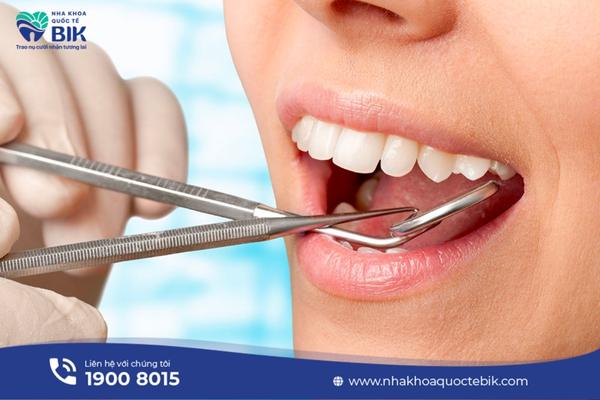
Although scaling brings many benefits to your teeth, it should not be done continuously because your teeth need time to regenerate and stabilize. Therefore, you should have your teeth scaled according to the regular schedule prescribed by your dentist for each dental case.
In particular, children under 10 years old need to have their oral health checked carefully before having their teeth scaled.
5.1. Every 6 months
Usually, experts recommend that everyone should have their teeth scaled every 6 months. This is a suitable time because at this time, the tartar plaque has not formed too much, causing difficulties during the process, bacteria have not caused problems for the mouth and teeth, and the gums have also recovered to normal since the previous scaling.
5.2. 3-4 times a month
Depending on the diet, oral hygiene habits and constitution of each person, there are still cases where it is recommended to have dental scaling done about 3-4 times a month:
– People who smoke, drink a lot of beer, wine, coffee and other dark-colored foods
– People with uneven tooth structure, rough enamel, making it easy for tartar to accumulate quickly
6. How to prevent tartar formation?
You can combine some of the following methods to effectively prevent tartar formation:
6.1 Proper oral hygiene
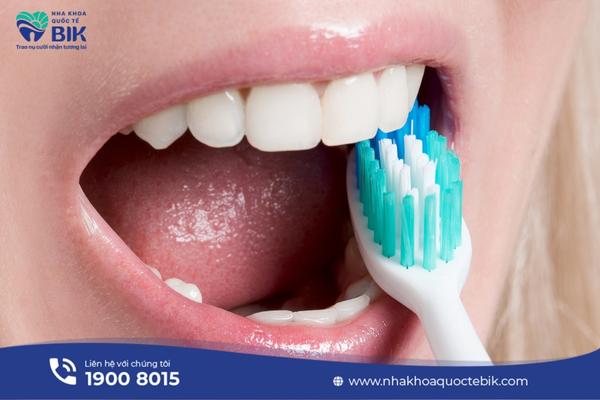
You should brush your teeth regularly at least twice a day with a soft-bristled toothbrush to clean the tooth surface, and you should combine it with toothpaste containing a lot of fluoride to help strengthen your teeth. However, because brushing your teeth will not completely clean the food particles in between your teeth, you can combine dental floss and mouthwash to completely remove the biggest cause of tartar.
6.2. Reasonable diet
Be careful not to eat too much sugar or starch to limit tartar formation. You should supplement with vitamins and calcium found in natural foods to help your teeth, while increasing resistance against harmful bacteria in the mouth.
6.3. Regular check-ups
You should have regular dental check-ups twice a year to monitor your dental health. At the same time, tartar will be removed immediately to avoid leaving serious effects.
Thus, BIK International Dental Clinic has provided necessary information about the effects of tartar as well as the effects of tartar removal on each person’s oral health. With the above benefits, customers should have their tartar removed periodically every 6 months at reputable dental facilities to have a confident, bright smile.




